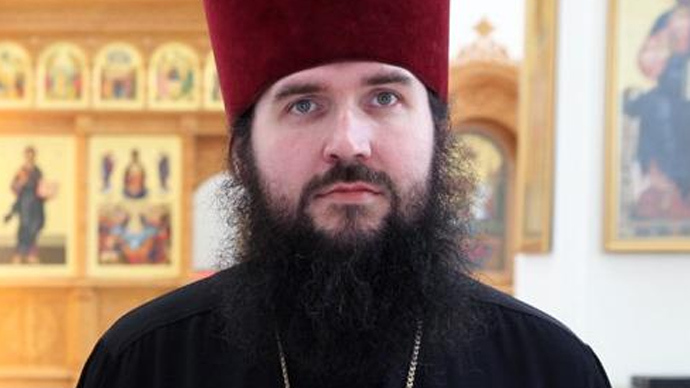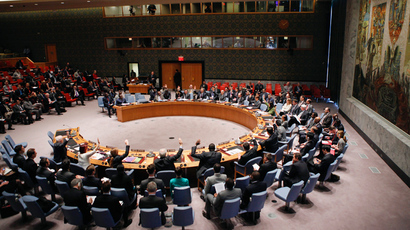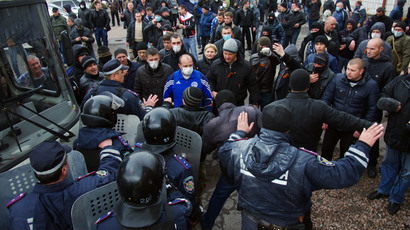‘Rights of believers are violated’: Orthodox priest flees Ukraine in fear

The rights of believers are violated in Ukraine as the coup-imposed authorities don’t want the Russian Orthodox Church in the country, archpriest Andrey Novikov, who left Ukraine to escape persecution by Kiev, told RT.
Novikov, who occupies the position of secretary of the eparchy of the Ukrainian Orthodox Church of the Moscow Patriarchate in Odessa, was forced to flee to Moscow after he was approached by the Ukrainian Security Service (SBU) in connection with the case of pro-Russian activist, Anton Davidchenko.
The Orthodox priest was invited to come to Kiev for questioning,
with the investigator warning him that: “now you are a
witness in this case, but maybe after the interrogation you may
become a person under investigation.”
“It’s ridiculous,” the clergyman said, stressing that he
knew Davidchenko , but never took part in pro-Russian rallies or
promoted separatism in any other way.
Novikov pointed out that the SBU showed interest in him after he
talked to OSCE observers, who arrived in Odessa and criticized
the new power in Kiev.
They “like to hide all the information” as everyone, who
has contacts with representatives of European and international
community is contacted by the security services and thoroughly
asked about the subject of the conversation.
According to Novikov, during his communication with the OSCE
(Organization for Security and Co-operation in Europe) he labeled
the coup-imposed authorities in Kiev “criminals,” who –
together with organizations like the far-right Right Sector
movement – create “an atmosphere of fear; an atmosphere of
terror” in the south-east of Ukraine.
“I told them about the situation with human rights in Ukraine
– the rights of believers, the rights of the church; that they
are now violated in Ukraine. I told them about several examples
and, especially, the example of my colleague, archpriest Oleg
Mokryak [who also left the country after an SBU search in his
home],” he said.
The archpriest is sure that he was heard by the European
observers, but doubts that they’re going to do anything about the
situation after the OSCE supported Kiev’s right to use military
against the pro-federalization protesters.

The new government “said that they came to power for European values. Is that a European value to use the army against own population? I think this is a question, which has only one answer,” he stressed.
But Novikov believes that it isn’t even his comments to the OSCE, but his convictions, which saw him persecuted by the security service.
“Of course, I’m a follower of the conception of the Russian World. I’m a priest of the Russian church. I believe that Ukraine is a part of the Russian World and the Russian Orthodox Church. I never hide my convictions, but as you see people in Ukraine are now persecuted for their convictions,” he said.
“New authorities in Kiev, I think, they believe that there’s no place for the Russian church and people with pro-Russian convictions in Ukraine… I don’t know what they’ll do? Arrest all of us?” the clergyman added.
According to Religion News Service, the Ukrainian Orthodox Church of the Moscow Patriarchate, which has 12,500 congregations, is the largest of three Orthodox churches in Ukraine.

The responsibility for the current crisis and the split between
Kiev and Moscow lies on the previous governments of Ukraine over
the last decades, Novikov stressed.
“During the existence of the Ukrainian state, in its western
parts – and now in central parts – grew generations of people,
which were taught that Russia is an enemy… that Ukrainians are a
higher race and all this Nazi teachings. And the state did
nothing to stop it. Even in state schools they taught pupils that
they always were different with Russia… and all the history of
Russian people and Ukrainian people is the history of
fighting,” he said.
But, at the same time, Novikov is confident that without the
support from the US, Canada and some European states the success
of the neo-Nazi organizations in Ukraine “wouldn’t be so
great”.
“We know that in Canada, especially – but in the US too –
there are several far-right Ukrainian organizations, which have
the same neo-Nazi ideology. And they support Dmitry Yarosh and
his Right Sector as well as other nationalist movements,” he
said.
The clergyman says that he unlikely to return home to Odessa
“when this government rules Ukraine.”
“I want it very much because I have there my family, my
laymen, my parish, my church, my colleagues. I was born in Odessa
and have lived there all my life…Ukraine has political prisoners
and victims of this regime. I will pray and wait for the future
with hope,” Novikov concluded.
Pro-Russian moods are on the rise in Odessa, which in recent days
saw rallies and a camp out of anti-government activists.
Unrest has gripped eastern – Russian speaking – parts of Ukraine
after pro-EU protests in Kiev ousted president, Viktor
Yanukovich, back in February.
Following the accession of the Republic of Crime to Russia,
people in Donetsk, Kharkov, Lugansk and other cities are also
calling for a referendum to decide their future as part of
Ukraine.













